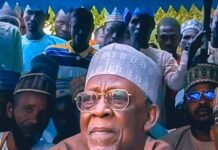He was a supreme symbol of destiny; he never wanted the military as a career, instead, he aspired to be an Islamic scholar. But providence had other aspirations for him and he ended up as a military officer, going through the ranks of his career culminating as a Major General in the Nigerian Army in 1993.
According to ancient legends, God preserves humanity regardless of its numerous transgressions because at any era there are persons who, without being aware of their role, redeem mankind. Major General Muhammad Gado Nasko (Rtd) is such a man propelled into fame by a series of unpredictable events with an impact so philosophical that can precisely be considered providential. Modest and without guile, he has never aspired for any political or national office; he is not obsessed with driving ambition.
General Nasko is endowed with the virtues of sincerity, honesty, loyalty, serenity, persona and integrity.
Muhammad Gado Nasko was born on June 20, 1941, in Nasko town of Magama Local Government Area of Niger State. He started his basic education at the Native Authority Junior Primary School in Ibeto from 1947-1954 and proceeded to Kontagora Senior Primary School from 1955 – 1956.
On completion of his primary education, young Nasko secured admission to Provisional Secondary School now (Government College) Bida in 1957 and left in 1962 after completing his secondary education. Despite having reservations about joining the military, destiny made him tow that path.
In December 1962, he started his career as a military officer with his secondary school mates which include: Generals Ibrahim Babangida, Abdulsalam Abubakar, Muhammad Magoro, Garba Duba, Muhammad Sani Sami (Emir of Zuru), late Mamman Vatsa and Col. Sani Bello Rtd.
General Nasko received his military training at the Nigerian Military Training College (NMTC) Kaduna from 1962-1963 and proceeded to Mons Officer Cadet School of Artillery, Larkhill, the United Kingdom from 1963-1964; United States School of Artillery, Fort-sill, Oklahoma in 1965; Station Gunnery Course at Royal School of Artillery, Larkhill, United Kingdom 1972-1973; Command and Staff College, Jaji, January – July 1977; National Institute for Policy and Strategic Studies Kuru, 1980. Rising through the ranks, he served in the following formations: Troop Commander and Battery Captain in (1967); Commandant, School of Artillery (1969); Commander, Artillery Regiment (1969), Commander, 2nd Artillery Brigade (1975) and Military Secretary (1976-1978).
In 1978, he was appointed Military Administrator of old Sokoto State (Sokoto, Kebbi & Zamfara) until 1979 when he left for another professional task as the Commanding Officer, 1 Artillery Division. He rose to the rank of Brigadier in 1980 and appointed Commander, Army Corps of Artillery (1980-1985).
He was a member of the defunct Supreme Military Council (SMC) from 1984-1985. He was promoted to the rank of Major General in 1984 and a member of Armed Forces Ruling Council (AFRC) 1985-1989.
He was appointed Minister of Trade by President Ibrahim Babangida (1985-1986); Minister of Agriculture, Water Resources and Rural Development (1986-1989) and Minister of Federal Capital Territory (FCT) from 1989 to 1993, which saw a time of rapid development and construction.
From 1978 to 1979 as military governor of Sokoto state, his administration constructed and renovated primary and secondary schools in many communities of what, today is part of Zamfara and Kebbi states. Old Sokoto state also witnessed development in road construction, urbanization, electrification and infrastructural development as part of his achievements as the military governor.
As a minister from 1986-1993, he stopped the import licence racketing and sanitized the Ministry of Trade, whilst in the Ministry of Agriculture, more agencies were established and policies to cater for food security of the nation. As the FCT Minister, an integration scheme was introduced through which the administration embarked on a deliberate programme of integrating existing communities into the Abuja Master Plan. He oversaw the rapid construction and expansion of the city and its environs.
Under his watch, important edifices which serve as office accommodation and symbols of the capital city were all constructed. Few of these projects include construction of National Intelligence Agency (NIA) Headquarters; State Security Services (DSS) Headquarters; provision of infrastructure in Jabi and Gudu Districts; Road access networks in the city of Abuja; Abuja Central Areas (Phases 1 and 11); Asokoro and Asokoro South West Extension (1 and 11); Maitama and Wuse General Hospitals; Asokoro, Kuje, Karshi, Orozo, Gwagwalada, Kubwa and Abuja Municipal Water Supply Schemes.
Other projects completed under his stewardship as the FCT minister include Phase 1 & II of Federal Secretariat complex in Abuja, 6 military barracks in Abuja, National Defence College (NDC), International Conference Centre (ICC), ECOWAS Secretariat, Presidential Villa and expansion of Nnamdi Azikiwe International Airport Phase I & II. Other projects completed include; Defence Guest House, Radio House, Defence Headquarters, NNPC Staff quarters, CBN Staff Quarters, NNPC Towers, Ministerial Quarters (Minister’s Hill) and official residential quarters at Asokoro, Wuse, Maitama, Apo Legislative quarters and many other places.
Many Nigerians could remember the early morning impressive ceremony of Thursday, December 12, 1991, when, as FCT minister, he handed over the key of the nation’s capital at the city gate of Abuja to President Ibrahim Babangida, formally signifying the relocation of the capital of Nigeria from Lagos to Abuja. When the history of the development of Abuja is written, General Gado Nasko definitely deserves a chapter for overseeing the construction of infrastructure and rapid development in the capital city with first-class amenities that were established for both domestic and international businesses.
His aura, coupled with a strong personality, makes him stand out among his colleagues and subordinates. When he speaks, you hear the wise words from a brilliant, honest, loyal and detailed person. He is highly respected, not only in the professional world but also amongst the common folk who came in contact with him. Throughout his military career, he tackled difficult situations in his public life with courage and confidence.
There was a sense of balance in his decisions. He was a soldier and technocrat with good qualities that enabled him to stand for his country without losing sight of the larger interests of the nation. He has strong hopes for, and belief in Nigeria. He worked, fought and dedicated his time for the betterment of our country even when the evidence was ambiguous. But many of us knew, heard and will never forget him.
General Nasko left the public service with no qualms, no second-guessing, and no obsessive chase of his place in history. All those that worked and came across him will bear witness that he has paid his dues in his quest to renew our country and restore hope to it. He was decorated by President Olusegun Obasanjo in 2006 with the national honour of Commander of the Order of the Niger (CON). He is one of the most respected statesmen in Nigeria.
As we look back to remember this awe-inspiring man that gave this country the institutions we are proud of today, especially in the Capital City of Nigeria, a sense of ethics and a deep sense of patriotism are still traceable in him as he led by example and left behind a profound legacy of hard work and honesty – traits that Nigerians today need most.
On the special occasion of his 80th birthday, I join his family, friends and well-wishers to salute this remarkable son of Nigeria- his selfless and dogged commitment to humanity and astonishing accomplishments will linger on for a long time to come.
He is happily married; blessed with children, namely: Hajiya Fatima Nasko, Zainab Tagwai Nasko, Umar Nasko, Maryam Umar Nasko, Hamza Nasko, Ibrahim Nasko, Abdul-Aziz Nasko, Abubakar Nasko, Aminu Nasko, and blessed with 25 grandchildren. May Allah grant Wambai of Kontagora Emirate many more peaceful and blessed years in sound health of body and mind.
Follow the Neptune Prime channel on WhatsApp:
Do you have breaking news, interview request, opinion, suggestion, or want your event covered? Email us at neptuneprime2233@gmail.com





